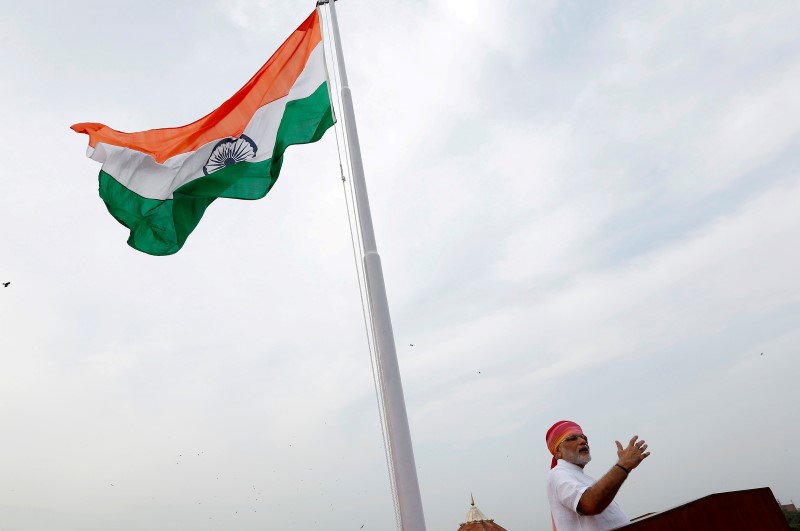By Rupam Jain and Tommy Wilkes
NEW DELHI/ISLAMABAD (Reuters) - When Indian Prime Minister Narendra Modi met top aides to prepare last week's annual Independence Day address, some senior bureaucrats warned him against mentioning Baluchistan, arch-rival Pakistan's restive southwestern province.
Referring to Baluchistan in such a prominent speech would be a highly unusual move bound to ratchet up tensions between the nuclear-armed neighbours more used to trading barbs over Kashmir, the cause of two of their three wars.
According to a senior official at the meeting in early August, the more hawkish politicians in the room, angered by what they saw as Pakistan's recent trouble-making in Kashmir, thought differently, and so did Modi.
By siding with the hawks, and including Baluchistan in his address, Modi signalled a more muscular approach towards Pakistan.
That dims prospects of bringing the bitter rivals closer together to reduce economic pain and the risk of more violence, an issue that will be high on U.S. Secretary of State John Kerry's agenda when he lands in New Delhi on Monday for a three-day visit.
"The bureaucrats suggested that talking about Baluchistan is a good idea but may be the Independence Day speech was not a good platform for it," said the official, who spoke on condition of anonymity because of the meeting's sensitivity.
Defence Minister Manohar Parrikar "rejected these ideas", while Home Minister Rajnath Singh "supported him (Parrikar) by saying we should do everything to silence Pakistan", this official said.
India's Ministry for External Affairs declined to comment on the debate about Modi's speech. His office, and the defence and home ministries, did not respond to requests for comment.
Speaking from the ramparts of the 17th-century Red Fort in Old Delhi on Aug. 15, Modi thanked the Baluch people for their support after a number of separatist leaders published videos praising him for acknowledging their cause previously.
He also lashed out at supporters of "terrorism", in a more familiar broadside against India's old foe.
CROSSING THE RED LINE
Pakistan has seized on Modi's speech as evidence that India has a hand in a decades-long Baluch separatist campaign, in which insurgents in the resource-rich yet impoverished region have launched sporadic attacks and demanded independence. India denies the charge.
A senior foreign ministry official in Islamabad said Modi had "crossed the red line".
Indian officials said Modi's speech was designed to remind the world about alleged human rights abuses by Pakistani forces in Baluchistan, just as Pakistan accuses India of abusing civilians in the disputed region of Kashmir during recent unrest.
But outside Modi's entourage, questions are being asked about what strategic reward, if any, India can hope to gain by raising the geopolitical stakes.
"Politically, it's much less useful in terms of Pakistan using this as evidence of Indian meddling. It gives them ammunition," said Daniel Markey, a South Asia expert at Johns Hopkins University in Washington, referring to Modi's mention of Baluchistan.
But he added: "There is a strategic utility in looking a little unhinged, in sending that message."
A New Delhi-based diplomat from a major power with traditionally close ties to India said it will only escalate tension.
DETERIORATING RELATIONS
Relations between India and Pakistan have deteriorated since the killing of a separatist leader in Indian-ruled Kashmir on July 8 sparked the worst violence in the disputed territory in six years.
At least 66 protesters and two security personnel have been killed and thousands wounded on both sides, according to official state figures.
India blames Pakistan for failing to stop militants crossing the heavily militarized de facto border between them and attacking Indian security forces. Pakistan denies this.
Two senior Indian officials said Modi had become frustrated with Pakistan's latest attempt to draw wide international attention to the Kashmir question and the current clampdown, and to take the matter to the United Nations.
"Dealing with militancy is our internal issue and we will not tolerate any other country's interference," said one of the officials, from Modi's nationalist ruling party, who is closely involved in regional policy.
At the August meeting, Parrikar, the defence minister, also said that by raising Baluchistan, Modi would be highlighting China's role in unrest in the region, said the official present.
The reference to China reflects Indian unease at Beijing's backing of a $46 billion trade corridor running through land in northeast Pakistan that New Delhi claims, onward through Baluchistan to the port of Gwadar on the Arabian Sea coast.
Some of the Baluch separatist leaders who praised Modi before his address worry that their battle for a homeland will become a political football between the South Asian neighbours.
"If India's support is just a reaction to the politics and to Kashmir, then it could damage the political struggle," said Geneva-based Baloch Republican Party leader Brahamdagh Bugti.

He said New Delhi had rejected his application for Indian asylum in 2007.